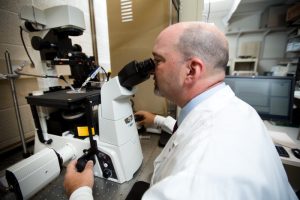Ophthalmic landscape for retinal pigmented epithelium cells has changed
Until recently, researchers investigating regenerative medicine stem cell therapies for eye diseases such as macular degeneration had to grow their own stem cell-derived retinal pigmented epithelium cells – a time-consuming and expensive process. The ophthalmic research landscape changed for these hard-to-grow cells when Mayo Clinic’s Alan Marmorstein, Ph.D. (OPH ’13), Department of Ophthalmology, created the spinoff company LAgen Laboratories.
LAgen, founded in 2015, manufactures ready-to-used bioengineered retinal pigmented epithelium cells (RPE) cells for researchers from Mayo Clinic, research labs and pharmaceutical companies around the world. The company’s capabilities are based on stem cell technology Dr. Marmorstein developed at Mayo Clinic and which LAgen has licenses from Mayo. RPE cells from induced pluripotent stem cells (iPSC) transplanted into the retina show promise in restoring vision and treating diseases caused by degradation of natural RPE cells.
“Promising research into RPE cell therapy has created a growing demand for stem cell-derived RPE cells,” says Dr. Marmorstein. “It’s painstaking to generate these cells, but they’re necessary to develop treatments for RPE-degenerative diseases such as macular degeneration, which affects as much as one-third of people older than 75.”
LAgen grows the iPSCs and subjects them to cocktails of agents to guide their development. A growth cycle takes 120 days and yields 80 times the original product. Customers order cells in flasks, in multiwell plates and in other forms.
The demand for the cells comes from basic research, disease modeling, toxicology testing and drug discovery. In addition to iPSC-derived RPE cells, LAgen offers optimized culture media, RPE-specific reagents and kits, and technical assistance.
Dr. Marmorstein plans to add RPE cells with disease-causing mutations as well as tackle the therapeutic market. “We already manufacture in a clean room. We would need to use different quality control processes and documentation and a different grade of reagents to produce therapeutics. It’s in our longer term plan,” he says.
‘Everybody gives everybody else a hand’
LAgen is housed in a biologics manufacturing facility on the northwest side of Rochester, retrofitted by Rochester Area Economic Development Inc. (RAEDI).
“I’ve only been at Mayo Clinic and in Rochester for four years. I find Rochester to be very supportive of start-ups,” says Dr. Marmorstein. “Mayo Clinic Ventures was encouraging and pointed me to local resources including the Mayo Clinic Business Accelerator and RAEDI. One step led to another, and I connected with other entrepreneurs in the city who helped with aspects of business I wasn’t familiar with.
“Many of my Mayo colleagues are involved with technology transfer and new spinoff companies. It’s refreshing because everybody gives everybody else a hand. Rochester presents great opportunities for this entrepreneurism.”
